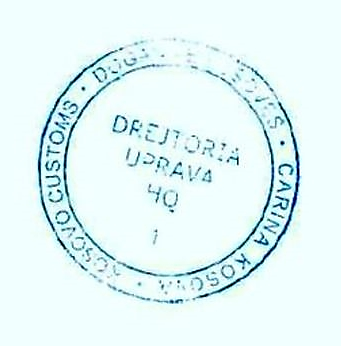Custom Stamps
Serbia and Kosovo reached the agreement on Custom Stamps on 2 September 2011. This meant that Serbia agreed to accept Kosovo’s custom stamps.
Prior to this, from Kosovo’s declaration of independence in 2008, the trade relations between Serbia and Kosovo had stopped, as Belgrade prohibited the import of goods from Kosovo and their transit to third countries. The two border crossings, Bërnjak/Brnjak and Jarinjë/Jarinje, were set on fire and Kosovo Serbs in the north resisted to integrate into the new system. For years, the northern part served as an informal economic zone and a breeding ground for illicit trade, where goods from Serbia entered openly and untaxed.
In July 2011, Kosovo applied reciprocity, by banning the import of Serbian goods and deployed special police units (at Jarinjë/Jarinje and Bërnjak/Brnjak) to enforce this measure. KFOR intervened to prevent the further escalation of the situation.
Two months after Serbia and Kosovo agreed on Custom Stamps, they reached another agreement, closely linked to this, the Integrated Border/Boundary Management (IBM).
The implementation of Custom Stamps agreement alone, took time and was quite challenging. In north, for instance, the agreement was not implemented at first.
On 17 January 2013, Kosovo and Serbia agreed on the Collection of Customs Duties, for the purpose of establishing customs control in the north, Jarinjë/Jarinje and Bërnjak/Brnjak.
This arrangement foresaw the establishment of a development fund for the four northern municipalities.
It meant that goods, could now, enter Kosovo through Bërnjak/Brnjak and Jarinjë/Jarinje crossing points, but the revenues collected from the goods that are destined for northern municipalities, are transferred to a Fund and are used to promote socio-economic development in Leposavić/Leposaviq, North Mitrovicë/a, Zubin Potok and Zvečan/Zveçan.

In the process of implementing this agreement, on 25 July 2013, The Assembly of Kosovo approved the Law on amending and supplementing the Law on the Budget (no. 04-L165) for the year 2013.
On 5 November 2013 parties reached the EU conclusions on the implementation, agreeing to initiate the collection procedure on 14 December 2013 (two weeks after the municipal elections in the four northern municipalities).
As for the goods that fall under a controlled regime (licensing), these conclusions foresaw that companies must apply for licenses in accordance with Kosovo legislation within 3 months of the start of the collection. During that period, companies could bring the goods in Kosovo, but would have to pay all applicable customs duties, excise duties as well as VAT in accordance with Kosovo legislation. Parties were further obliged to exchange, before 30 November 2013, their respective lists of licensed human and veterinary medicinal products and devices.
The implementation of the licensing of companies from north of Kosovo on controlled goods started on 1 January 2015.
Over the time implementation of these arrangements made significant progress:
- It enabled the free movement of goods and regulated the trade between the two countries.
- Allowed Kosovo’s export to and through Serbia; Kosovo exports to Serbia rose to 30 million euros per year, while Serbia exports to Kosovo came to approx. 400 million euros a year.
- Helped in establishing the rule of law and reducing the informal economy in the area. The illicit trade in the north dropped and the registration (in accordance with Kosovo law) of import-oriented companies; which previously operated in gray area, increased.
- And enabled Kosovo to join the World Customs Organization; an important step to advance economic relations and trade with countries of the world.
However, some shortfalls remain:
- The use of provocative stamps stating ‘Pristina and Kosovska Mitrovica Customs’ from Serb parallel customs authorities;
- Long border procedures (up to 12 hours) for Kosovo exporters;
- And other non- tariff barriers (Sanitary and Phytosanitary conditions, Voluntary export restraints, Import licenses, Complex rules of origin etc.) and tax measures.
Agreements in PDF



